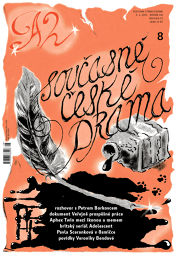The March elections in Slovakia sparked a curious debate about the Pyrrhic victory of Robert Fico, PM and leader of Smer-Socialni Demokracie [Direction- Social Democracy]. Some argued that Fico would not be able to form a government because he failed to crank up the anti-immigrant, islamophobic rhetoric in the style of the neo-facist leader of the Banská Bystrica region Marian Kotleba. Others countered that Fico imitated Kotleba – aptly seconded by Czech president Miloš Zeman – too much, and thus paved the way to power for the so called “patriots” who will yet make the blood freeze not only in Slovakia but around the world. They will stump, shout, and chant “heil” in the Parliament, and Fico will not be able to keep up and will disappear from the political scene after possible premature elections.
There is something both terrifying and logical about the idea that it is necessary to undercut neo-facists by a speedy fascization of the centre-left politics that will take them under their wing (to smother them, even though this is not talked about). It is a kind of a logical monstrosity and a monstrous logic at once. In turn, a strategy that would seek to unite voters on the basis of “European values” and defeat right-wing extremists with kid’s gloves of “true democrats” leaves a huge question mark. The whole situation makes it seem that the fate of democracy as Central Europe had known it, at least in rosy daydreams of the past, is once again sealed.
Faced with the elections in Slovakia, reputable western European newspapers of the best of the most horrifying worlds continuously pen editorials about the “neoliberal model” in the V4 countries that suffer from “post communist legacy.” On March 8, Le Monde still mused that confronted with the refugee crisis, Budapest, Warsaw, Prague, and Bratislava showed that they simply are not at the level of “democratic culture that EU member countries consider to be matter of course.” These are harsh words, albeit toned down by a statement that neither the Czech Republic nor Slovakia - in contrast to Jaroslaw’s Kaczynsky’s Poland and Viktor Orban’s Hungary - have not become authoritarian regimes. And even these two countries differ in that Miloš Zeman at the Prague castle hardly is and never will be the renowned philanthropist that Andrej Kiszka was at the Bratislava castle. The same editorials, full of loathing for the eastern barbarians, simultaneously admit that the “rise of far right is unfortunately not limited to Central Europe and that old western European democracies do not unanimously accept refugees either.” Thus, the problem is hardly limited to our central European backwoods. Even those contexts where liberalism has flourished for centuries – save for the periods of dictatorships, revolutions, fascisms, and streams of blood caused by two world wars – and that have not suffered from the “communist legacy” experience the problem as well.
And it is even worse. Western Europe has turned more Visegrad-like; more Orban-like; more Zeman-like; more Kaczynsky-like, or at least more Fico-like. For not too long after Budapest decided to build an anti-immigrant fence on the borders between Hungary and Serbia and Croatia, a barrier domino began to be built not only toward Croatia, Slovenia, Serbia, and Macedonia, but also toward Austria, Sweden, Denmark, France, Belgium, Norway, and eventually the generous Germany. Even pope Francis, the possibly last guru of the liberal left, suddenly began talking about an “Arab invasion.” And the “democratic culture” of the West now stands and falls with deterring immigrants in every possible way: bulldozers in Calais and paralytic gas on the Macedonian-Greek border, increased activity of the Frontex agency, NATO fleet in the Aegean sea equipped with the latest technology used to discover wobbly immigrant boats, and, least but not last, granting a free rein to the Turkish government to prevent those boats from sailing to Greece, the now arguably largest European hot spot that experiences a humanitarian catastrophe every day.
A mere day after the Slovak elections, a turn to Kotleba-like Europe - blamed on poor Fico – culminated at a gathering of the European 28 in Brussels where the “fort Europe” was fully restored. The authoritarian regime of Recep Tayyip Erdogan, who since official rules a “safe country,” was ceremoniously declared to be a major stopper of the so called Balkan refugee route; i.e. a route from the South to the false hope for a better life that is denied by the North. Are the pope-like worse than the Pope? Be it as may, not only the Visegrad leaders but all nationalists, xenophobes, and neofascists are now political vanguards determined to defend European values.
Why is this – to return to the beginning -so monstrous, yet systematically logical? It is because European elites do not offer alternative responses to their voters' social aspirations than those offered by fascized nationalists. They are aware that tough times are returning. And perhaps they don’t want to cut off the neofascist steam engine so much. Perhaps it is about jumping into a running train; an attempt to assume the yet unfilled spot of a train driver. Or, rather, a train führer.

